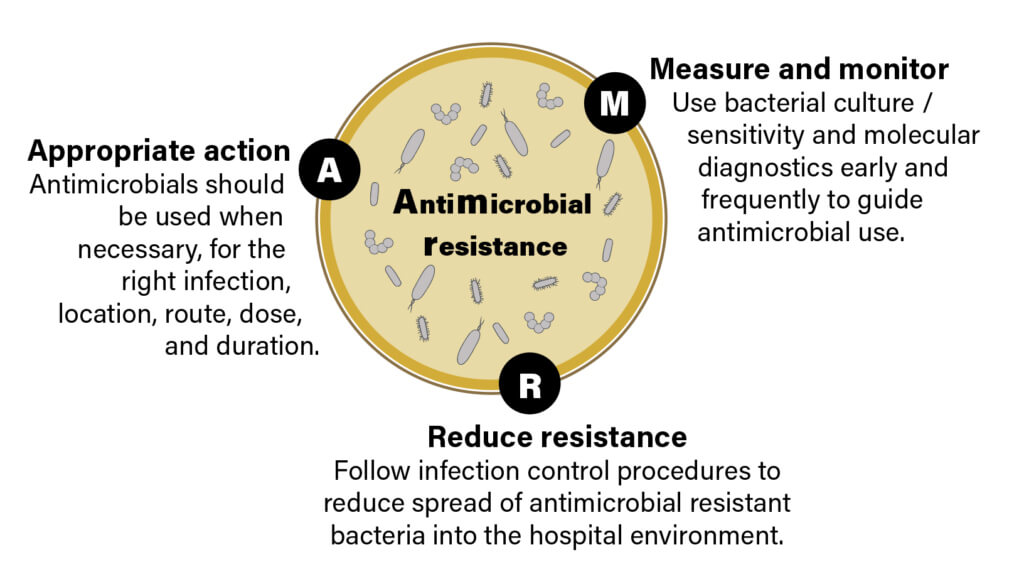PVM recognizes World AMR Awareness Week by explaining Antimicrobial Resistance – what is it and why does it matter?
Antimicrobial resistance (AMR) is a growing, significant One Health issue across the world. The WHO estimates that AMR was directly responsible for 1.27 million global deaths and contributed to 4.95 million deaths, with additional significant economic costs. AMR affects all countries and all income groups, and to tackle this urgent problem, researchers, producers, and practitioners from all areas must address the critical shortage of new antimicrobial drugs, and the use of antimicrobial drugs in medicine, farming, and industry. The Global Antimicrobial Resistance and use Surveillance System (GLASS) report from WHO, and the updated Antimicrobial Resistance Threats factsheet from the CDC highlight the effects of AMR on global health.
Veterinary medicine has an important role in stemming the growth of AMR, and in practicing antimicrobial stewardship in all areas of veterinary practice. The Purdue University College of Veterinary Medicine is working with collaborators across the spectrum of research, production, environmental studies, and veterinary medical/human medical providers and educators within Purdue and across the globe to address this urgent challenge.
The week of November 18-24 is US Antibiotic Awareness Week and World AMR Awareness Week, and the college is taking advantage of these national and global campaigns to raise awareness here at PVM about AMR and antimicrobial stewardship, and to highlight some of the research and practices being conducted at PVM to address AMR.
In the Purdue University Veterinary Hospital, active programs address antimicrobial stewardship and AMR awareness and mitigation. The Infection Control Committee develops policies and standard operating procedures for hospital practice, as well as providing continuing education for staff and students.
Education within the Doctor of Veterinary Medicine and Veterinary Nursing degree programs address AMR and antimicrobial stewardship within courses in each year of the programs. This academic year, seven new interactive teaching modules were integrated into the curricula to further emphasize important learning issues in AMR, infection prevention and antimicrobial stewardship.
Additional PVM AMR initiatives
PVM works together with others on the Purdue campus to address AMR. Click here to see more about what we are doing. Please also join us for the Third Annual AMR Conference at Purdue, February 26-27, 2025. Click here for more information.
AMR is a complex problem at the intersection of human, animal and environmental health (“One Health”) that can only be addressed through a multidisciplinary approach as through Purdue’s AMR Conference. We welcome a diverse audience to this meeting including not only academics, but medical and veterinary practitioners, and individuals working in the areas of public health, food production, food safety and biotechnology. The annual AMR meeting has been designed to facilitate networking and collaborations so we can tackle AMR together
PVM engages and participates with national and international partners fighting AMR and promoting antimicrobial stewardship. Some examples include:
- The International Society for Companion Animal Infectious Diseases (ISCAID)
- The University of Minnesota College of Veterinary Medicine Antimicrobial Resistance and Stewardship Initiative – Purdue has contributed to this group’s point prevalence antimicrobial use surveys.
- The Companion Animal Antimicrobial Stewards (CAAMS) – Purdue faculty and staff attend the CAAMS Small Animal Antimicrobial Stewardship Workshop, and participate in the many working groups within this important group that are making great strides to provide uniform educational materials and guidelines for antimicrobial stewardship in veterinary medicine.
There are many PVM researchers whose research programs address AMR. We will highlight their work in the coming weeks!

